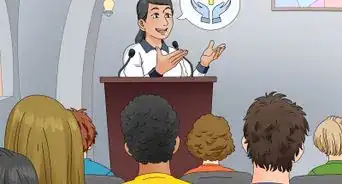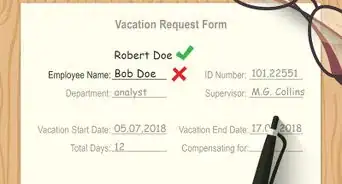This article was co-authored by Alicia Oglesby. Alicia Oglesby is a Professional School Counselor and the Director of School and College Counseling at Bishop McNamara High School outside of Washington DC. With over ten years of experience in counseling, Alicia specializes in academic advising, social-emotional skills, and career counseling. Alicia holds a BS in Psychology from Howard University and a Master’s in Clinical Counseling and Applied Psychology from Chestnut Hill College. She also studied Race and Mental Health at Virginia Tech. Alicia holds Professional School Counseling Certifications in both Washington DC and Pennsylvania. She has created a college counseling program in its entirety and developed five programs focused on application workshops, parent information workshops, essay writing collaborative, peer-reviewed application activities, and financial aid literacy events.
wikiHow marks an article as reader-approved once it receives enough positive feedback. This article received 11 testimonials and 87% of readers who voted found it helpful, earning it our reader-approved status.
This article has been viewed 306,545 times.
Have you always been the one with a low score on every subject? Have you always been regarded as "the dumb one"? Well, if you want to improve your grades and test scores then read on from step one below to be smarter in school. Better grades in high school can lead to a good college or university, which can lead to a good job, which can lead to a healthy and comfortable life.
Steps
Being Smart in School
-
1Do your assignments. Most people don't like getting homework, but it has an important purpose. Homework helps you review a lesson while the information is still fresh in your mind. It also lets your teacher know if you understand the concepts or need more help.
-
2Take neat and tidy notes in every class. Note-taking is a lot of work, but in the long run, it pays off. Writing stuff down in and of itself helps you remember it better. And when the test rolls around, you'll have plenty of material to study from.[1]
- Focus on vocabulary when taking notes. Knowing the definitions of different terms in Science or Language Arts is always helpful. Sometimes teachers might give you extra credit, merits or points.
Advertisement -
3Clear your mind and focus on the teacher. Focusing on the teacher will not only allow you to keep up the subject, but if you don’t listen to the teacher, you might risk not knowing how to do your homework or acing an upcoming test.
-
4Turn in your assignments on time. If you turn in your assignments on time, your teachers will appreciate it.
- Try doing the assignment as soon as possible.
- Don’t procrastinate until the last minute. The assignment will not receive a good grade!
Studying
-
1Study your textbook and notes. This is especially important for any subject you have a difficult time with. Bring your textbook home at night and go over previous lessons for the test (and maybe the next lesson, as well). If you study every night, you'll be fully ready for any test you face.
-
2Use flash cards when you study. Flash cards are useful for geography, spelling, vocabulary, math, etc. Have someone quiz you or use them to quiz yourself. That way, you can build up your knowledge so it will stay with you.
-
3Keep a planner to keep track of your assignment. Write down your assignments, due dates, test dates, and so on. That way you can stay organized and won't have to worry about forgetting anything.[2]
Making Yourself Smarter
-
1Read every night. Reading is helpful for people of all ages: it helps you learn vocabulary, spelling, and grammar while expanding your mind to new ideas. Challenge yourself to read a variety of materials such as classics, non-fiction, autobiographies and things outside typical school reading lists. If your school has a library, you should take some time at lunch or break to go there and just read some books to exercise your mind before class.
-
2Bring your reading book home to study. If you need to write a book report or essay on it later on, it will be much easier if you write down notes while reading. Post-it notes are helpful for marking important pages for later reference.
-
3Do further research. After you get home from school and finish your normal homework, why not look into what you learned during the day? Look for newspaper or online articles, essays, and informational books. Look for worksheets or quizzes as well. Taking some notes is a good idea.
- Try to learn something new every day. For instance, you could research a different math term every day, or a new vocabulary word. Try subscribing to a "word per day" website (one that suits your age group). That way you will receive a new word on Twitter or through email every day.
- Try to research something for each class; for instance, you could research dichotomous keys for science and composers for music. For Literature, you could study poets, and for History, you could research different historical periods.
-
4Keep yourself informed on current events. Read the newspaper and watch the news. This will be helpful in any Politics or Social Studies classes, and it will also help you gain a deeper understanding of the world we live in.
- Playing an instrument might not have socializing involved, but it will also help expand your mind.
-
5Write stories or keep a diary in your spare time. This will help you practice grammar, syntax, and creative writing in general. If you dedicate time to writing, your teachers will notice.
-
6Do some science experiments at home and show your teacher. Examples include a paper-mache volcano, a sundial, or salt crystals. This will impress them (and maybe earn you some extra credit).
Keeping Your Relationships
-
1Be on good terms with your teachers. Teachers are there to help you. Be nice and respectful to your teacher. Show them that you're serious about your education: pay attention in class, raise your hand, ask questions when you're confused, participate in classroom discussions, and so on. Let them see that you are engaged in the subject. Ask them if there's anything you should work on. And if you need help, ask them for it.
-
2Join extracurricular clubs. Studious clubs such as debate, journalism, chess, and math will put you in an academic mindset. You will become more well-rounded and get more familiar with the activities that you enjoy. They are also a great way to meet and befriend like-minded individuals who can teach you lots of new things.
-
3Keep it balanced! You need a social life and some fun to be healthy and happy. Everyone needs a break once in a while. Hang out with your friends and spend quality time with your family. Being smart doesn't mean you can't have fun.[3]
Warnings
- If you are being bullied, you should tell your parents or your teachers.⧼thumbs_response⧽
- If you struggle, don't worry. Just ask an adult to help you.⧼thumbs_response⧽
- If your teacher is mean, just pay attention in class and do your work. You could also read How to Deal With a Mean Teacher⧼thumbs_response⧽
-Step-1-Version-2.webp)
-Step-2-Version-2.webp)
-Step-4-Version-2.webp)
-Step-5-Version-2.webp)
-Step-10-Version-2.webp)
-Step-3-Version-2.webp)
-Step-6-Version-2.webp)
-Step-7-Version-2.webp)
-Step-8-Version-2.webp)
-Step-12-Version-2.webp)
-Step-13-Version-2.webp)
-Step-11-Version-2.webp)
-Step-9-Version-2.webp)
-Step-14-Version-2.webp)






























































